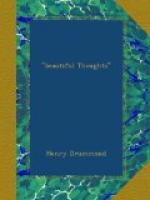May 15th. The ill-tempered person . . . can make very little of his environment. However he may attempt to circumscribe it in certain directions, there will always remain a wide and ever-changing area to stimulate his irascibility. His environment, in short, is an inconstant quantity, and his most elaborate calculations and precautions must often and suddenly fail him. Natural Law, Mortification, p. 191.
May 16th. What the ill-tempered person has to deal with, . . . mainly, is the correspondence, the temper itself. And that, he well knows, involves a long and humiliating discipline. The case is not at all a surgical but a medical one, and the knife is here of no more use than in a fever. A specific irritant has poisoned his veins. And the acrid humours that are breaking out all over the surface of his life are only to be subdued by a gradual sweetening of the inward spirit. Natural Law, Mortification, p. 191.
May 17th. The man whose blood is pure has nothing to fear. So he whose spirit is purified and sweetened becomes proof against these germs of sin. “Anger, wrath, malice and railing” in such a soil can find no root. Natural Law, Mortification, p. 192.
May 18th. The Mortification of a member . . .is based on the Law of Degeneration. The useless member here is not cut off, but simply relieved as much as possible of all exercise. This encourages the gradual decay of the parts, and as it is more and more neglected it ceases to be a channel for life at all. So an organism “mortifies” its members. Natural Law, Mortification, p. 193.
May 19th. Man’s spiritual life consists in the number and fulness of his correspondences with God. In order to develop these he may be constrained to insulate them, to enclose them from the other correspondences, to shut himself in with them. In many ways the limitation of the natural life is the necessary condition of the full enjoyment of the spiritual life. Natural Law, Mortification, p. 195.
May 20th. No man is called to a life of self-denial for its own sake. It is in order to a compensation which, though sometimes difficult to see, is always real and always proportionate. No truth, perhaps, in practical religion is more lost sight of. We cherish somehow a lingering rebellion against the doctrine of self-denial—as if our nature, or our circumstances, or our conscience, dealt with us severely in loading us with the daily cross. But is it not plain after all that the life of self-denial is the more abundant life—more abundant just in proportion to the ampler crucifixion of the narrower life? Is it not a clear case of exchange—an exchange, however, where the advantage is entirely on our side? We give up a correspondence in which there is a little life to enjoy a correspondence in which there is an abundant life. What though we sacrifice a hundred such correspondences? We make but the more room for the great one that is left. Natural Law, Mortification, p. 195.




